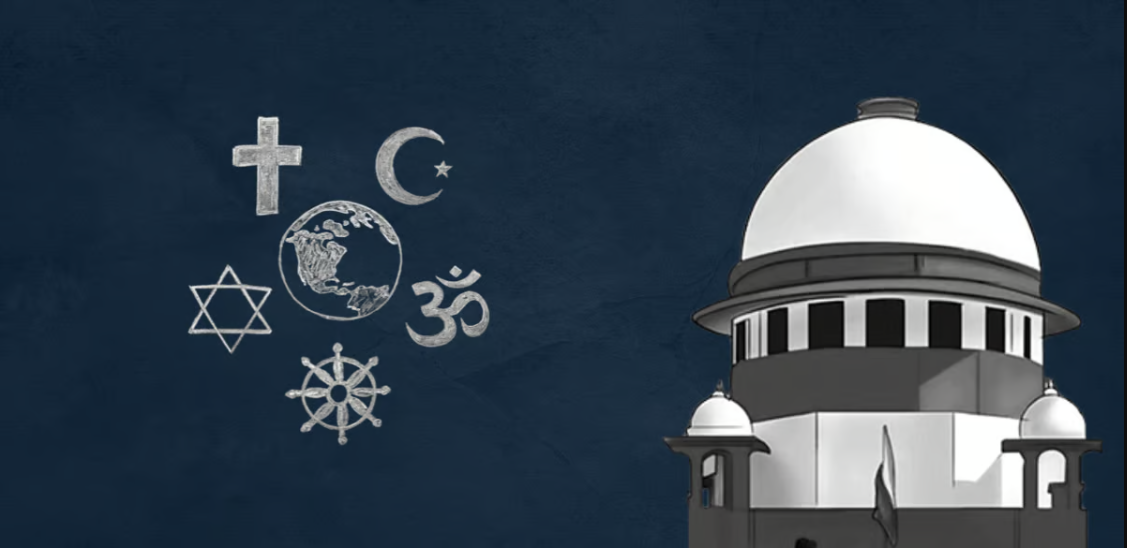On December 12 at 3:30 PM, the Supreme Court will review multiple writ petitions questioning the constitutionality of the Places of Worship Act (Special Provisions) Act, 1991. This case addresses significant legal and religious considerations.
On December 12 at 3:30 PM, the Supreme Court will review multiple writ petitions questioning the constitutionality of the Places of Worship Act (Special Provisions) Act, 1991. This case addresses significant legal and religious considerations.
The Supreme Court of India is set to review a series of writ petitions that challenge the constitutional validity of the Places of Worship Act (Special Provisions) Act, 1991, on December 12 at 3:30 PM. This significant legal matter will be examined by a specialized bench led by Chief Justice Sanjiv Khanna, along with Justices Sanjay Kumar and K.V. Viswanathan. The petitioners contend that this legislation is arbitrary and unreasonable, asserting that it infringes upon their fundamental right to practice their religion, which they argue contravenes the fundamental rights guaranteed under Articles 14 and 25 of the Indian Constitution.
The lead petition, identified as Ashwini Kumar Upadhyay v. Union of India, was lodged in 2020, prompting the Court to issue a notice to the Union Government in March 2021. Subsequently, additional petitions, including Vishwa Bhadra Pujari Purohit Mahasangh v. UOI and Dr. Subhramanian Swamy and Others v. UOI, have emerged. These petitions also contest the statute, which aims to maintain the status quo regarding religious structures as they existed on August 15, 1947, and prohibits any legal actions aimed at altering this status.
The Union Government has yet to submit its counter-affidavit in this case, despite numerous extensions granted by the Supreme Court. Most recently, on July 11, 2023, the Court instructed the Union to file its response by October 31, 2023. The delay in this response raises questions about the government's stance on this pivotal issue.
Furthermore, the Managing Committee of the Gyanvapi Mosque has taken a proactive approach by filing an intervention in the Supreme Court concerning the challenges against the Places of Worship Act of 1991. Their application emphasizes that any declaration from the petitioners stating the Act is unconstitutional could lead to severe consequences. The Managing Committee argues that they are a crucial stakeholder in these proceedings, particularly in light of various suits aimed at the mosque's removal, despite the protective measures established by Sections 3 and 4 of the 1991 Act.
As these proceedings unfold, they will undoubtedly contribute to the ongoing discourse surrounding religious rights and the intersection of law and faith in India. The implications of the court's decision could reshape the legal landscape concerning places of worship, further influencing socio-political dynamics and community relations across the nation.
Case details relevant to this matter include Ashwini Kumar Upadhyay v. Union of India, W.P. (C) No. 1246/2020, Vishwa Bhadra Pujari Purohit Mahasangh v. UOI, W.P. (C) No. 559/2020, and Dr. Subhramanian Swamy and Others v. UOI, W.P. (C) No. 619/2020. As the Supreme Court prepares to deliberate on these cases, stakeholders from various sectors are keenly observing the proceedings, given their potential to influence not only legal interpretations but also broader societal norms relating to religious practices in India.
Like
Dislike
Love
Angry
Sad
Funny
Pray
'Trump Tracker: Tulsi Gabbard's Surprising Appointment as US Intelligence Chief
November 14, 20249th Ayurveda Day in Melbourne: A Celebration of Ayurvedic Innovations and Global Health Impact
November 10, 2024🍪 We Value Your Privacy and Experience Hi there! We use cookies to enhance your browsing experience, provide personalized content, and analyze site traffic. By continuing to use our site, you consent to our use of cookies.







Comments 0